Batman v. Superman: Dawn of Justice was not entirely a bad movie.
Like the nascent Superman, struggling with his own identity, and the weighty notion of morality vs. obligation, BVS doesn’t know what it wants to be. It is at times a promising display of cinematic capability, with luscious shots framed with considerable expertise, and at other times a toxic snarl of action shots reminiscent of a train crash. There are scenes that swell with operatic promise and epic grandeur and others that mete out little more than a bleak and confusing jumble of story fragments incapable of forming a whole. Said more plainly: it’s a mixed bag for sure.
Batman v. Superman is not a movie incapable of being fully enjoyed by an audience; it is just a movie that is unlikely to be fully enjoyed by an audience. It is deeply unsatisfying, regardless of whether or not viewers are fans of these characters from previous films or from their source material.
As ever, this review is subjective but well-intentioned. I will endeavor to point out the good along with the bad and perhaps figure out why a film that should have earned universal praise is instead the most divisive entry in the DCU to date.
Spoilers below. Spoilers below. Spoilers below.
THE GOOD:
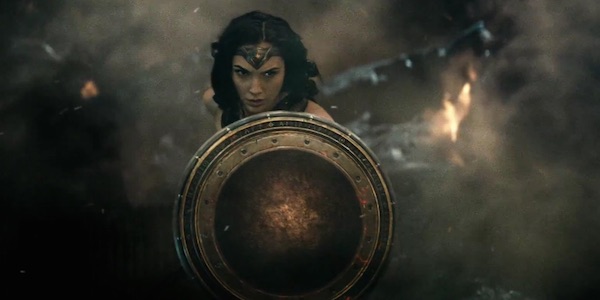
1. Ben Affleck as Batman/Bruce Wayne: It’s a pity that the debut for Affleck’s interpretation of the Dark Knight is in a film that does so little with the dynamics of his character and his identity. Affleck is perfectly cast, creating a deeply physical portrait of a man driven to the brink of obsession. His older Batman is sufficiently grim without coming off as over the top (though in this movie it’s hard to tell) and his Bruce Wayne is exemplary: cerebral and brooding with a thin veneer of charm, just enough to offset the calculations of the monster within. Much to my dismay, BVS is another entry in which we don’t get to see much use of Batman’s intellect, and the world’s greatest detective is once against reduced to his weakest form: an armored combatant.
2. Gal Gadot as Wonder Woman/Diana Prince: Despite a dearth of screen time, Gadot is breathtaking as Wonder Woman, successfully stealing every scene she’s in, including the film’s final fight with Doomsday. She creates a figure that is dignified, even rigid, and her regal mystery helps to class up the film in a way that the other personalities are incapable of doing. A better film might have been crafted out of Bruce Wayne’s pursuit of the mysterious woman at the party, but alas, the world needed saving.
3. Amy Adams as Lois Lane: One of the few redeeming parts of Man of Steel was Adams’ Lois Lane, a less-cartoonish version of the strong-willed journalist depicted in earlier incarnations. Likable, interesting, and most importantly believable, Adams often reads as the only real person in a world gone mad around her. She brings heart and courage to her role in BVS, even while mired in a screenplay that puts her constantly – and conveniently – in harm’s way. If for no other reason than being able to elevate the damsel in distress from a worn out plot device to a position of power, she might be the movie’s best performance.
4. The ‘Day of the Dead’ Sequence: In one of the film’s only really inspiring moments, Clark leaves Luthor’s party and flies all the way to another country to save a girl from a burning building. If that’s not Superman, what is? It’s amidst a Dia de los Muertos celebration, and immediately following the rescue, the costumed populace converge on Superman as if he is a god – or perhaps the God. It’s a moment made famous from the trailer, but is no less visually stunning for having been spoiled earlier. It’s also one of the movie’s few instances of showing rather than telling. Yes, look, they think this man is God, rather than, let us discuss the implications inherent in Superman being like God on Earth…
5. Granny’s Peach Tea: Lex Luthor’s unique brand of malice is perfectly encapsulated in a mason jar filled with urine, sitting on Senator Finch’s desk and masquerading as “Granny’s Peach Tea” – alluding to a joke the senator had made after blocking Luthor’s plans for importing Kryptonite. Bonnie Hunt plays the moment before her death to perfection, her words failing as she puts the pieces together, realizing too late that Luthor was too potent an adversary. The surprising explosion sets the perfect tone for everything that follows – and gives us our best glimpse at Snyder’s take on Lex Luthor: childlike, petty, and psychotic.
THE BAD:
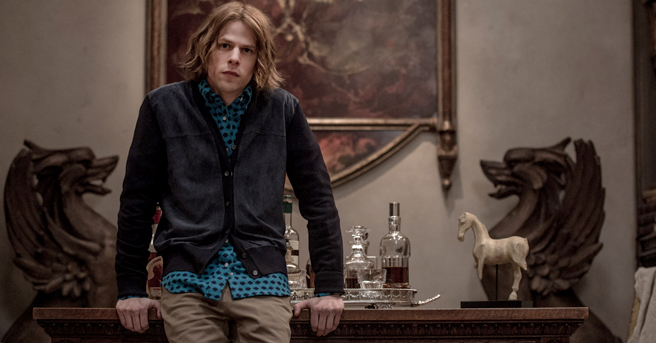
1. Henry Cavill as Superman/Clark Kent: Henry Cavill is truly a perfect physical specimen – a tribute to what human genes are capable of. And if Superman is all about the look for you, this guy has it all over. He’s handsome with a capital kill yourself. Unfortunately BVS asks Cavill to take on too much: the torment caused by the lives lost in the destruction of Metropolis, the deep love and devotion he feels for Lois – his “whole world,” the low boil of self-control when dealing with Batman or even Luthor, and the ponderous nature of the film’s philosophical overtones. Cavill handles everything with one of three varying facial expressions, none of which seem to convey anything remotely human. To an obvious point, though, perhaps that’s the alien in him.
2. Jesse Eisenberg as Lex Luthor: Let it be known that I think Jesse Eisenberg is a terrific actor. His work in The Social Network, Zombieland, and The Squid and the Whale are some of my favorites by any actor of his generation. And yet his Lex Luthor misses the mark by a wide margin. Some of this, of course, can be attributed to the vision of Zack Snyder. Whereas Lex is normally depicted as a cool corporate magnate with deep pockets and a thirst for power, this Luthor is meant to be one for the modern age: hip, trendy, and yet dangerously out of touch. The drastic change in the character’s established personality might have come off better if Luthor’s motivations in BVS were clearer. As it stands, the most we get as to why Luthor hates Superman is a vague speech about the relevance of gods, an ominous painting in Luthor’s study, and a ham-fisted reference to past physical abuse at the hands of his father. None of these are particularly compelling reasons for his hatred of the alien menace, and thusly the greatest rivalry in all of comics falls utterly flat. Lex Luthor hates Superman. Why? It doesn’t seem to matter to anyone on screen – or likely anyone behind the camera. We are left with a pale shade of the Riddler – or worse, Toyman.
3. Bruce Wayne is a Terrible Spy: You would think an older Bruce Wayne would be a master of stealth and deception (spoiler: he is Batman). And yet, in a particularly painful scene at Luthor’s party, Batman has to walk down a flight of stairs, hack into Luthor’s databanks, walk back up a flight of stairs, act casual, and then walk back down the same flight of stairs to retrieve the data – and he utterly fails. In what might be the film’s worst-written sequence, Bruce is spotted by every character of consequence in a scene that should be tailor-made to display his skills as a sleuth. Luthor, Mercy, Clark, and Diana all know what the Caped Crusader is up to in a scene that simultaneously displays the carelessness of the script and the nonsensical floor plan of Luthor’s house of glass.
4. Batman v. Superman: Unresolved: The title of this movie is rather counterintuitive. The film is sort of about the grudge match between Batman and Superman, but it never really delivers. The two men fight, in a display of action that is relatively underwhelming considering the buildup, but it’s hard to declare a victor. Yes, Batman stands over Superman triumphantly, holding the Kryptonite spear in what might have been Superman’s last moment if Lois hadn’t intervened, but even if Bruce had skewered the alien scum, who would have won the philosophical debate between them? Both men believe the other is beyond the law but neither come to any affirming conclusion that exempts themselves or one another from the charge against them. Would Batman murdering Superman prove that he was justified in acting outside the law to rid the world of a potential threat? Would Superman blasting Batman to smithereens ensure that all people of the world must act within the strictures of the written law? The answers are as unclear as the accusations, resulting in a deeply unsatisfying resolution of their conflict. Speaking of…
5. “Martha”: The unhappy coincidence that Bruce Wayne and Clark Kent’s mothers are both named “Martha” is a major plot point in this film, and ultimately the one that stays Batman’s hand as he is about to pierce Superman’s heart. The revelation that both women are named Martha completely obliterates the issues that have been building since the beginning of the film and essentially undoes the film’s entire purpose.
[Actual excerpt from the script below:]
Batman: Your very existence is a threat to humanity and you must die.
Superman: You act outside the law and are a danger to those you seek to protect. You must be stopped!
(They fight.)
Lois: Wait! Your mothers are both named Martha.
Batman: Bro. My bad. Let’s unite our forces. BFFs.
Superman: Bro. Totes.
Lex: The fuck is this?
THE UGLY:
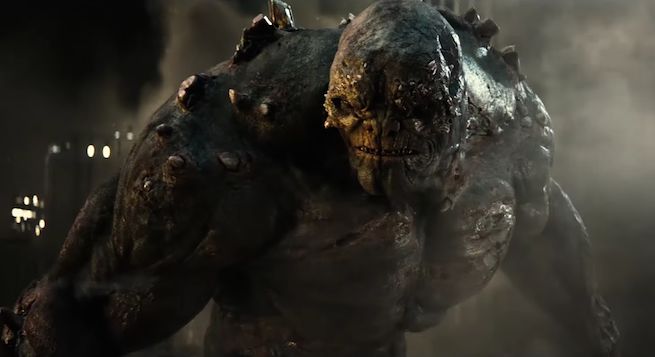
1. Zack Snyder: This guy just can’t get out of his own way. Snyder is clearly a passionate individual with a talent for cinematic image crafting. 300 and Watchmen were terrific (though divisive), Sucker Punch and Man of Steel – maybe not so much. As a visionary, Snyder leaves something to be desired. When faithfully adapting the pages of comics to the screen, as was the case with both 300 and Watchmen, there are few better at getting the panels to come to life. However, when in charge of getting his own ideas across, aided and abetted by a screenplay under his purview, he becomes his own undoing. His concept for BVS was more than little misguided, resulting in a sunless, humorless, and joyless world wherein life is cheap and heroes are unfettered by the petty concerns of those to whom they are allegedly responsible. The philosophical questions Snyder presents are enormous and remain unanswered. What is the responsibly of a god to those who worship him? Is it acceptable to act outside of the law if it may ensure the safety of others? Do those in power have an obligation to the powerless? Snyder doesn’t bother to guess at any of these and it’s unclear if he expects us to. Is this to be the crucible in which the Justice League is forged? Will this man give his audience nothing to cheer for, nothing to delight in in these captured moments of comic book heroes on screen? It remains to be seen, but I remain doubtful. Sometimes I believe Snyder still thinks he’s directing Watchmen, unaware that all comic book films need not be so deconstructionist and devoid of hope.
I have often thought that Zack Snyder was the sort of little boy who played very roughly with his toys. Now I know for sure.
2. The Dark Knight Returns/The Death of Superman: It’s clear from the art direction alone that the inspiration for the film comes largely from Frank Miller’s The Dark Knight Returns and the infamous Death of Superman storyline. I couldn’t think of two more unlikely stories to try to tell simultaneously. The result is a sloppy fusion of the worst elements of both those stories: the gritty, grimdark streets of TDKR‘s Gotham have overrun Metropolis and the Doomsday monster takes out Superman in a fight that strains the investment of the audience. Perhaps Snyder was cursed with Tim Burton’s legacy, a need to tell the Superman Lives story that had so famously never been told. Now we know why.
3. Batman the Unrepentant Killer: Has Batman killed before? Yes. Has he wielded guns before? Yes. Because both of those things have happened before, is that the best course of action a filmmaker should take when interpreting the character for the general audience? Absolutely not. Part of what makes Batman a fascinating character is that he has a personal moral code. He views murder as reprehensible – it’s part of the essential truth of what makes him Batman. You could no more separate Batman’s aversion to murder from his personality than recover Martha Wayne’s pearls from the gutters of Crime Alley. Why Snyder so carelessly chose to allow his Batman to burn through human lives as if they were tissue paper is beyond me. Affleck sells the choice with aplomb, but it doesn’t sit right with me and it never will. How easy Batman’s life would be if he could simply destroy those who stand in his way – and if that is the case, we are in for a far less interesting character in future installments.
4. Doomsday: It’s no secret that I think the Death of Superman storyline was one of the worst in comics history, and that Doomsday is Superman’s least compelling villain. In BVS, Doomsday is reimagined as a product of Lex Luthor’s perverse desire to harness Kryptonian technology for his own. What results is a nigh-unkillable lump of flesh that slowly evolves into the famous beast from the comics, protruding bone shards included. As a final act they could have done a lot better, as there is only one way a fight with Doomsday can end: an unyielding snoozefest of punches until the monster finally goes down for the count. Any other foe might have been chosen from Superman’s extensive canon, resulting in what might have been a fight with actual intelligence or even (gasp) dialogue, but no. Just more opportunities for punching. So much punching.
5. Dream Sequences: Snyder relies heavily on dream sequences to give background to the characters and to (sigh) set up for the inevitable Justice League movie. Much to my chagrin, we are forced to watch the Waynes murdered yet again, if only to emphasize Thomas Wayne’s final utterance, “Martha,” said no doubt in some grasping attempt to echo Kane’s “Rosebud.” Other sequences give us plenty to gawk at, including a glimpse at a future ruled by Darkseid, a message from a time-traveling Flash, and a dalliance with ol’ Pa Kent. Worse, none of these sequences are needed, justified, or explained. They do nothing to further the plot of BVS, merely to broaden the scope of its diminished world. Non-comic readers were no doubt entirely befuddled by the appearance of the omega symbol in the ground or of the young man suspended in lightning, screeching that Lois is the key. What relevance did these moments share with the dangers at hand? Like so much else in this screenplay, the links aren’t clearly visible, if they are there at all.
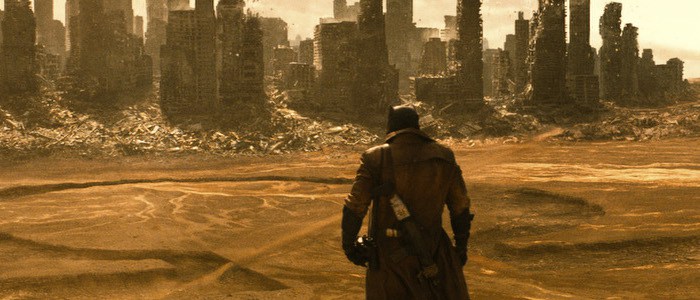
Undoubtedly, Snyder’s departures turned what should have been a surefire hit into another film that is bloated beyond all imagining, one that perilously piles new story elements on the bones of an already weak plot structure, resulting in total collapse. What may be best remembered about this movie was that it was able to do so little with so much, resulting in a disappointing finale to years of speculation.
And yet all is not lost. There is quite a lot of excitement in the film, if not outright joy. There is some beautiful imagery. And though the sun never peeks from behind the the clouds or the cover of night, there is a thrill there in the darkness. A good movie exists somewhere in the dross, its bright paint obscured by the tone. I sincerely hope the next director to pick up Snyder’s broken toys is able to fix them.
In way of a final verdict, I would like to say that the movie is worth seeing, if for no other reason than to own your own opinion. Perhaps you will come away with fewer gripes and more appreciation for Snyder’s sullen rollercoaster than this reviewer. One caveat: if you are unable to locate your sense of wonder in the first hour, perhaps you will feel as others have – that Batman v. Superman: Dawn of Justice is, as a better writer might have said, “a tale told by an idiot, full of sound and fury, signifying nothing.”

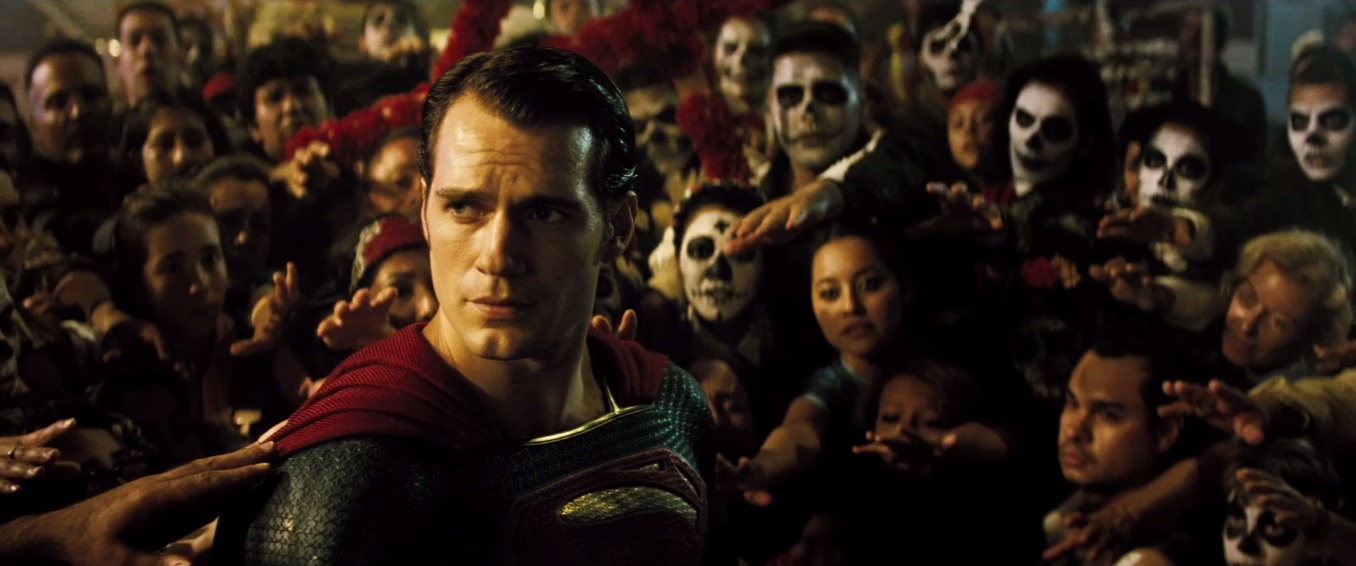
GET CHOMPED